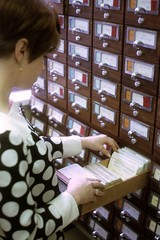I remember the days (does that make me old? I never thought I’d start a sentence that way…) when searching for something in a library meant a visit to the card catalogue. The card catalogue, for those of you too young to remember, or those of you old enough to remember but who have blocked the memory, was the early version of Google for libraries — a collection of all of the bibliographic information in the library typed onto small index cards and filed alphabetically in long, skinny drawers. A visit to the card catalogue was often frustrating, generally led down many dead ends before paying off in the information for which you were looking, and was a very time-consuming process. And yet I come to praise the card catalogue, not to bury it.
For all of the card catalogue’s negatives, there were certain coincident positives as well. For one thing, the search itself was so onerous that it forced you to be very thoughtful and judicious in your queries. Today, if you are trawling Google for information, it’s so easy that you don’t have to think much about your search. Type something in, and Google is probably smart enough to find some relevant results for you. If not, just type something else in and try again. With card catalogues, you wanted to think for a minute before diving in. Looking for information about beach erosion? You could obviously start out in the “E” section for “erosion”, but you might also want to look at “sand”, “tides”, “storms”, and (of course) “beaches” as well. Because search results were not instantaneous and were not guaranteed to be plentiful, starting off with a good search was important. So why is thoughtful and judicious searching something to be valued in the Google era? Well, even though it’s likely that a Google search will get you going in the right direction, we are all becoming pretty reliant on those first one or two pages of Google search results in our daily quest for knowledge, and this means not just being reliant on Google’s database of information, but also reliant on Google’s algorithm for retrieving that information. To get one or two pages of results from Google is easy; to get one or two pages worth of card catalogue results, you’d have gone through a lot of effort (some of it unnecessary) and independent thought (almost never unnecessary), all of it gleaned from the card catalogue, but none of it filtered through any sort of card catalogue search algorithm. You were the search engine, in the good old days. We had a clear separation of database and search process, and that had some benefits.
One of these benefits was the fruitful but unanticipated detours in your search. For example, perhaps you were looking in a card catalogue for information on, oh, say, mathematical platonism. You started with “mathematics”, but there were hundreds of entries and you couldn’t figure out how to parse them for information on platonism. So you shimmied over to the “platonism” entries and found a bunch of cards relating to non-mathematical topics such as moral platonism, platonism as it relates to epistemology, and Plato’s platonism. Perhaps you had a vague idea of what mathematical platonism is about, but didn’t really know from where the platonist agenda sprang in the history of philosophy. Well, by virtue of simply getting a touch lost in the card catalogue, you have had the benefit of seeing a broad but useful outline of that history. And, if you were a motivated scholar, you would have written down the Dewey decimal numbers of several of those philosophical tomes and gone into the stacks to get grounded in what platonism is all about. (Ah, a tour through the stacks! Sort of like a bigger version of touring through the card catalogue — you’ll see all sorts of relevant and irrelevant books that may take you places you would never have thought to travel. Searching through Amazon.com for books is just not the same.)
When browsing through card catalogues, there was also the ancillary benefit of wildly tangential detours. Simply by being near, say, the entries for “Ontario”, you might have stumbled across some entries for “ontology” just by letting your fingers travel too far down the row of index cards. And perhaps one of the titles there would have sparked your interest enough to go see what ontology is all about. A Google search for “Ontario” will not likely take you down this path.
I obviously understand completely the benefits (and the necessity) of switching from card catalogue systems to electronic versions. Problems of updating, misfiling, redundant cataloguing, space, etc. I get it. And I don’t want to bring us back to Luddite days of yore. I love computers. I love databases. I love smart computerized searching. But there was something special about the analog searching we used to do that has been lost in the digital conversion. Computers have become the fast food restaurants of searching — it used to take effort to prepare and create a healthy search; now anybody can get a search served up to them in an instant, cooked by a hopefully benevolent chef who thinks she knows how to best feed us.



